
Ukraine ‘has one month to hold knife to Crimea’s throat’ and force Putin into peace talks
Ukraine has just four weeks to hold a "knife at Crimea's throat" and force Vladimir Putin into peace talks before Russia's army recoups over winter, experts have warned. Professor Mark Galeotti, academic and author of more than 20 books on Russia, said Volodymyr Zelensky’s troops need to move another 10 miles southwards to be in range of striking key Russian supply routes in Crimea. He claimed this is the only “serious” chance Ukraine has to force Mr Putin into negotiations before the Russian army has the opportunity to regroup over winter. “They’ve got about another month of campaign season. But if things slow down, the Russians will use the winter to regroup themselves and the whole thing will start up again in spring,” the professor, who teaches Slavonic and East European Studies at University College London, told The Independent. “If Ukraine can move another 10 miles southwards, Russian road and rail links used to resupply Crimea will be in range of their artillery. “The only serious chance Ukraine has of forcing Putin to the negotiating table is by holding a knife at Crimea’s throat. But I think that is going to be next year’s campaign.” It comes after President Zelensky admitted that Ukraine’s counteroffensive was progressing slowly, but insisted that more territory was being reclaimed every day. “The situation is tough,” he told CBS’s 60 Minutes. “We stopped the Russians in the east and started a counteroffensive. Yes, it is not that fast but we are going forward every day and de-occupying our land.” Ukrainian generals claimed they had recaptured the eastern villages of Klishchiivka and Andriivka near Bakhmut over the weekend. Earlier this month, Ukrainian forces also breached Russia’s first line of defence near Zaporizhzhia in the south of the country, taking the village of Robotyne. This Zaporizhzhia area is a “key” battlefield, as breaking through would allow Ukrainian forces to strike out towards the Sea of Azov, Professor Galeotti said. This would allow Ukrainian forces to disrupt and destroy supply lines linking Rostov-on-Don, in Russia, and the Crimean Peninsula, which was annexed in 2014. But Dr Marina Miron, a postdoctoral researcher at King’s College London war studies department, it was "very unlikely" there would be a major breakthrough for Ukraine this year as its "window of opportunity" was now closing ahead of winter. “The rain is already starting,” she said. “The weather will get a lot worse.” Ukraine launched its counter-offensive in June to push Mr Putin’s forces out of land captured by Russia after the invasion began in February 2022, striking along the 600-mile frontline in areas including the Bakhmut, Kharkiv and Zaporizhzhia regions. But as the offensive slows it is now “touch and go” as to whether Ukraine can make a “real, pivotal difference” in the war by the end of this year, Dr Miron said. “The main effort will be to sustain troops throughout the winter. Ukraine will not be in a position to carry on the offensive,” Dr Miron added. She explained Ukraine had a “heavy logistical” footprint with German Leopard and British Challenger 2 tanks, but they would be harder to use in wetter, muddier conditions, to assist a full breakthrough. “They’re just not designed for those types of terrains,” she said. “They would risk losing more equipment getting bogged down in winter conditions than waiting it out until getting F-16 fighter jets.” In August, Denmark promised the delivery of 19 F-16 jets to Ukraine. Six will be delivered by the end of this year, followed by eight in 2024 and five in 2025, according to Danish prime minister Mette Frederiksen. However, Ukraine admitted it could take up to six months to train its military to use the jets and they would not be in operation this winter. With fears growing around wavering Western support as the war draws on, Dr Miron said: “Neither side have an infinite supply of money or manpower. But Russia does have time. And that’s what they are betting on.” Read More Ukraine-Russia war – live: Putin’s brigades ‘suffer heavy losses’ as counteroffensive advances around Bakhmut Kremlin says Russia and China must edge closer to counter Western efforts to contain them US defense chief urges nations to dig deep and give Ukraine more much-needed air defense systems
2023-09-19 23:28
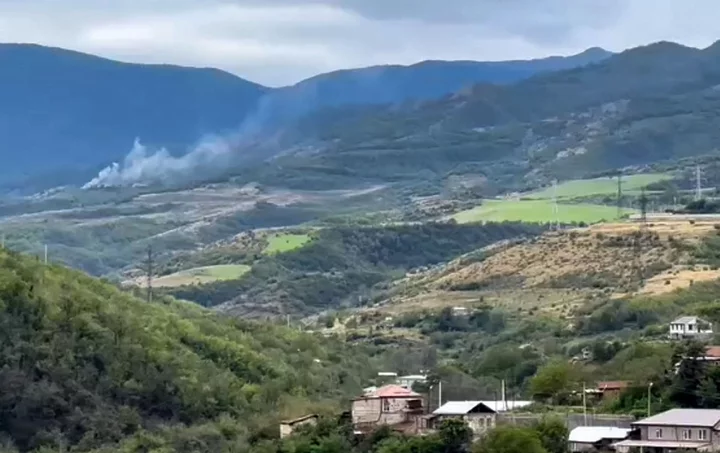
Nagorno-Karabakh: Fears of full-scale war as Azerbaijan launches attack on Armenian positions
Azerbaijan has launched what it has called an “anti-terrorist operation” targeting Armenian military positions in the breakaway region of Nagorno-Karabakh, as heavy artillery firing was reported around its capital. The Azerbaijani defence ministry announced the start of the operation hours after four soldiers and two civilians died in landmine explosions in the Nagorno-Karabakh region. It raises concerns that a full-scale war over the region could resume between Azerbaijan and Armenia, which fought heavily for six weeks in 2020. The ministry did not immediately give details but said “positions on the front line and in-depth, long-term firing points of the formations of Armenia’s armed forces, as well as combat assets and military facilities, are incapacitated using high-precision weapons”. The Azerbaijani statement said: “Only legitimate military targets are being incapacitated.” But ethnic Armenian officials in Nagorno-Karabakh said the region’s capital Stepanakert and other villages are “under intense shelling”. Earlier on Tuesday, Azerbaijan said six people died in two separate explosions in the region, which is partly under the control of ethnic Armenian forces. A statement from Azerbaijan‘s interior ministry, state security service and prosecutor-general said two employees of the highways department died before dawn when their vehicle was blown up by a mine and that a truckload of soldiers responding to the incident hit another mine, killing four. Nagorno-Karabakh and sizeable surrounding territories had been under ethnic Armenian control since the 1994 end of a separatist war, but Azerbaijan regained the territories and parts of Nagorno-Karabakh itself in a six-week war in 2020. That war ended with an armistice which placed a Russian peacekeeper contingent in Nagorno-Karabakh. But Azerbaijan alleges that Armenia has smuggled in weapons since then. The claims led to a blockade of the road connecting Nagorno-Karabakh to Armenia, causing severe food and medicine shortages in the region. Red Cross shipments of flour and medical supplies reached Nagorno-Karabakh on Monday but local officials said road connections to the region were not fully open. The hostilities come amid high tensions between Armenia and its longtime ally Russia. Armenia has repeatedly complained that the 3,000-strong Russian peacekeeping force was unable or unwilling to keep the road to Armenia open even though that duty was stipulated in the agreement that ended the 2020 war. Armenia also angered Russia, which maintains a military base in the country, by holding military exercises with the United States this month and by moving toward ratifying the Rome Convention that created the International Criminal Court, which has indicted Russian President Vladimir Putin. Russian foreign ministry spokeswoman Maria Zakharova on Tuesday denied claims that Russia was informed in advance of Azerbaijan‘s intention to mount the operation, saying the peacekeepers were notified only “a few minutes” before it began. Reporting by Associated Press.
2023-09-19 22:26
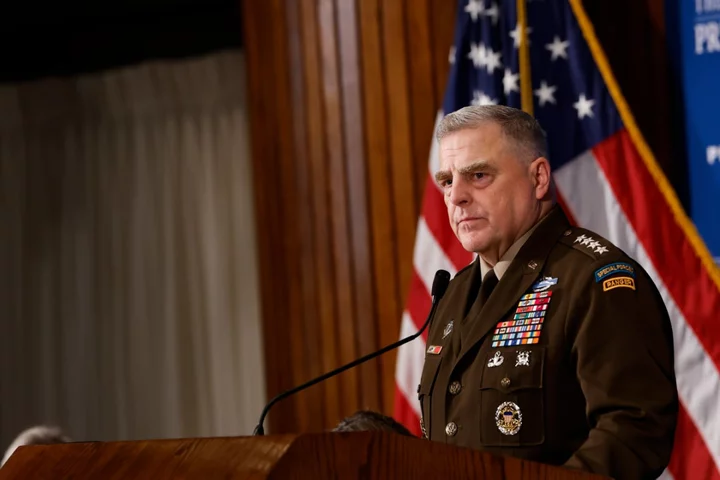
Putin still has ‘well over 200,000 troops’ in occupied Ukraine, top US general says
Ukraine could take time to “kick out” over 200,000 of Vladimir Putin’s troops from its soil even if its military counteroffensive achieves all its goals, a soon-to-retire US military general has claimed in a new interview. The comments come as Ukraine has stepped up its counteroffensive against Russia in the last few days by retaking a couple of key villages near battle-worn Bakhmut and launched joint intelligence ops in Crimea, the territory Moscow illegally annexed in 2014. “There’s well over 200,000 Russian troops in Russian-occupied Ukraine,” General Mark A Milley, who is set to retire as the chairman of the US Joint Chiefs of Staff, said in an “exit interview” to CNN. “This offensive, although significant has operational and tactical objectives that are limited in the sense that they do not – even if they are fully achieved – they do not completely kick out all the Russians, which is the broader strategic objective that president Zelensky has,” he said. Ejecting Russian soldiers from the entirety of Ukraine is going to take a long time and will be “a very significant effort over a considerable amount of time”, Mr Milley said. The general said he doesn’t want to “put a time on it because a lot of things can happen in a war”. “You could see a general collapse, you can see escalation, you could see a lot of different things happen in the future, but I can tell you that it will take a considerable length of time to militarily eject all 200,000 plus Russian troops out of Russian-occupied Ukraine. That’s a very high bar, that’s gonna take a long time to do it,” he said. Earlier this month, Mr Milley said Ukraine only has around 45 days left before poor weather conditions hinder its continuing counteroffensive. It will become “very difficult to manoeuvre” once it starts raining, according to the head of the US military. “That offensive kicked off about 90 days ago,” he said, referring to recent criticism about the counteroffensive. “It has gone slower than the planners anticipated. But that is a difference between what (Prussian general and military theorist Carl von) Clausewitz called war on paper and real war,” he said. “So these are real people in real vehicles that are fighting through real minefields, and there’s real death and destruction, and there’s real friction. “And there’s still a reasonable amount of time – probably about 30 to 45 days’ worth of fighting weather left. So the Ukrainians aren’t done,” he said. “This battle is not done. They haven’t finished the fighting part of what they’re trying to accomplish. So, we’ll see… It’s too early to say how this is going to end. They at least have achieved partial success in what they set out to do, and that’s important. And then the rains will come in. It’ll become very muddy,” he said. “It’ll be very difficult to manoeuvre at that point, and then you’ll get the deep winter, and then, at that point, we’ll see where things go. “But right now it is way too early to say that this offensive has failed or not failed.” In the same interview, Admiral Sir Tony Radakin, the UK’s Chief of the Defence Staff, said Ukraine is “winning” because Russia failed to bring the country under its control. The Ukrainian counteroffensive is now in its fourth month and its forces have now had a series of territorial successes against Russian forces, including closing in on the country’s eastern areas from multiple directions. Russia had invaded Ukraine in February last year. Ukraine’s pushback, backed by its Western allies who have poured help through modern machinery and funds, has so far been marked by small victories and is awaiting more major breakthroughs. Read More Ukraine-Russia war – live: Putin launches attack on Lviv as Russian defences breached near Bakhmut villages Ukraine’s Zelensky questions why Russia still has place at UN ahead of New York address Explosions shake Lviv as western Ukraine under air raid alerts for Russian drone strikes Ukrainian troops claim to have liberated Bakhmut village from Russia UNGA Briefing: Biden, Zelenskyy and what else is going on at the United Nations
2023-09-19 16:54
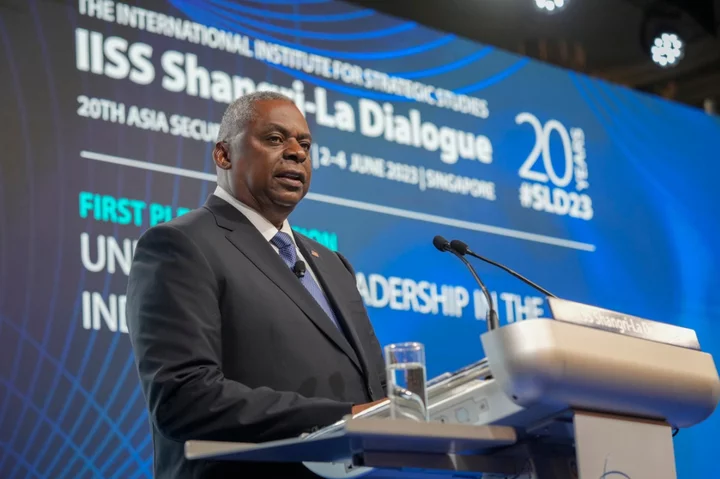
Watch live as US defence secretary Lloyd Austin delivers remarks ahead of Ukraine summit in Germany
Watch live as US secretary of defense Lloyd J. Austin makes opening remarks before he hosts an in-person Ukraine Defense Contact Group (UDCG) meeting at Ramstein US Air Base in Germany on Tuesday 19 September. The meeting of allies assisting Kyiv has been highly anticipated and comes as the United States explores the shipment of ATACMS longer-range missiles packed with cluster bombs to Ukraine. Ukraine has also been pushing Germany to send similar Taurus missiles that could give them the ability to cause significant damage deeper within Russian-occupied territory, but Berlin has repeatedly said it will only act in concert with Washington on arms deliveries. Ahead of the meeting, it was confirmed that German defence minister Boris Pistorius will not take part at the UDCG meeting due to Covid-19 infection.
2023-09-19 16:23
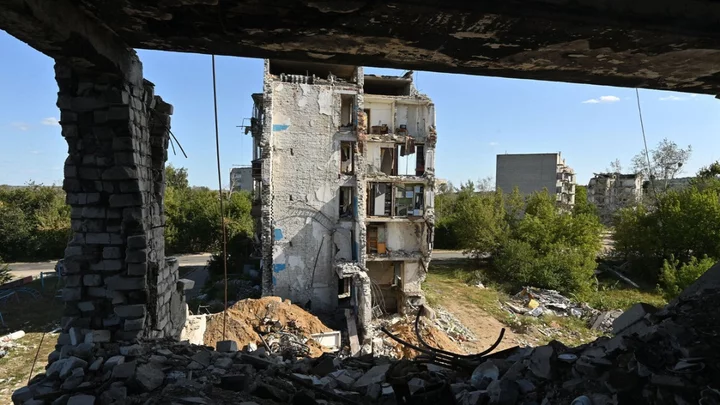
Watch live as World Court hears Ukraine’s response to Russian objections in genocide case
Watch live as Ukraine responds to Russia’s objections against the jurisdiction of the World Court in a genocide case brought by the nation, which claims Moscow falsely applied genocide law to justify its 2022 invasion. The International Court of Justice (ICJ), the principal judicial organ of the United Nations, is holding public hearings on the preliminary objections raised by the Russian Federation in the case from 18 to 27 September. Ukraine brought the issue to the UN’s highest court just days after the Russian invasion on 24 February last year, arguing Moscow is abusing international law by saying the invasion was justified to prevent an alleged genocide in eastern Ukraine. Russia wants the case to be thrown out and objects to the jurisdiction of the International Court of Justice. The hearings will not delve into the merits of the case and are instead focused on legal arguments about jurisdiction. Ukraine has already cleared one hurdle as the court decided in its favour in a preliminary decision in the case in March last year. Based on that, the court ordered Russia to cease military actions in Ukraine immediately. Read More
2023-09-19 15:24
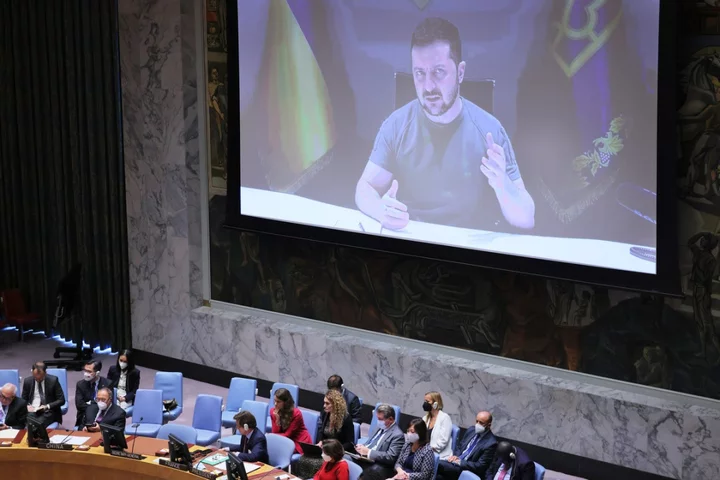
Ukraine’s Zelensky questions why Russia still has place at UN ahead of New York address
Volodymyr Zelensky posed the question of why Russia and Vladimir Putin continued to have representation at the United Nations to world leaders ahead of his UN security council speech. Mr Zelensky was speaking in the US after visiting wounded Ukrainian military members at a New York hospital shortly after arriving for his diplomatic tour on Monday. "For us, it’s very important that all our words, all our messages, will be heard by our partners. And if in the United Nations still – it’s a pity, but still – there is a place for Russian terrorists, the question is not to me. I think it’s a question to all the members of the United Nations," he said. Follow latest live updates on coverage of Ukraine war here The Ukrainian president is likely to cross path with Russia’s top diplomat at the United Nations during the upcoming UN Security Council meeting. On being asked if he will stay in the room to listen to Russian foreign minister Sergei Lavrov’s remarks at the meeting, Mr Zelensky said: “I don’t know how it will be, really”. Mr Lavrov had called Mr Zelensky a “b*****d” and walked out after a round of condemnation and accusations of war crimes aimed at Russia in last year’s UNSC meeting. “Such outrages remain unpunished because the United States and their allies with the connivance of international human rights institutes have been covering up the crimes of the Kyiv regime based on the policy of ‘Zelensky might be a b*****d, but he’s our b*****d’,” the foreign minister said. He walked out after his speech and remained absent for most of the session having already arrived 90 minutes late – missing UN chief Antonio Guterres’s briefing. The Ukrainian president had confronted the UN even before the war launched by neighbour Russia, who, as a Security Council member, is entrusted with maintaining international peace and security. In September last year, Mr Zelensky detailed the Russian atrocities in Ukraine and described a sweeping peace plan to end the war in his previous address to the UN General Assembly. “How can we allow the Russian army somewhere on Ukrainian soil, knowing that they are committing such mass murder everywhere?” Mr Zelensky asked. “We cannot. We must protect life. The world must protect life.” He also called on the international community to temporarily strip Russia of its UN powers, continue sanctions, and establish a special tribunal to oversee the peace process. He lamented at the General Assembly in 2021 that the UN was a “retired superhero who’s long forgotten how great they once were”. Mr Zelensky will be making a case for Ukraine’s protection and security assurances as the country continued to fight off a Russian full-scale invasion for nearly 600 days now. He will also seek help from Washington ahead of a looming winter. The US Congress is currently mulling over president Joe Biden’s request to provide Ukraine with as much as $24bn more in military and humanitarian aid. Mr Zelensky will spend some time at the Capitol Hill on Thursday and then proceed to meet with Mr Biden at the White House. Read More Ukraine-Russia war – live: Kyiv commander says Russian defensive line breached near villages of Bakhmut Explosions shake Ukraine’s Lviv as western parts remain under air raid alerts Heading for UN, Ukraine's president questions why Russia still has a place there How Ukraine’s battle for the Black Sea is inflicting serious pain on Putin’s forces New explosions at Sevastopol as Ukraine launches fresh drone strikes on Crimea
2023-09-19 14:26
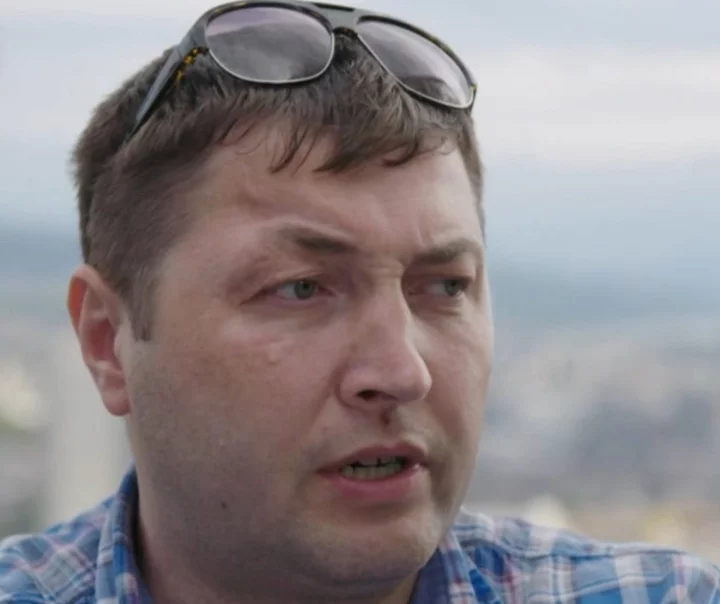
Yury Garavsky: Belarus ‘hit man’ to stand trial in Switzerland over high-profile killings
A Belarusian “hit man” who served with the country’s special forces and is accused of the forced disappearance of three high-profile opposition figures will finally stand trial in Switzerland – 24 years after the three vanished. Yury Garavsky, 44, was arrested following a confession in which he said he was involved with a group linked to the kidnapping and presumed killings of adversaries of Belarus’s current president Alexander Lukashenko. In 2019, Garavsky gave testimony to German public broadcaster Deutsche Welle about his part in the 1999 killings of three of president Lukashenko’s political opponents. He was working for the interior ministry’s SOBR special forces unit then. He even claimed he was present during the executions of former interior minister Yury Zakharenko, opposition politician Viktor Gonchar and pro-opposition businessman Anatoly Krasovsky. Now a Swiss court will determine the veracity of his claims. Zakharenko had vanished in May 1999. In September that year, Gonchar and his friend Krasovsky were abducted. Families of the three have been waiting for the trial to start to begin. Garavsky, who sought asylum in Switzerland in 2018 after fleeing Belarus capital Minsk, pointed out in his interview earlier that his superior Dmitry Pavlichenko shot the three victims in the chest. Mr Pavlichenko, however, has denied the allegations. The BBC reported that daughters of the two abducted men, both of whom left Belarus shortly after their fathers’ kidnappings, are set to appear in court this week. Both said the trial in the city of St Gallen will provide them with some solace. Garavsky is facing trial in Switzerland, where he was arrested, due to the country’s adherence to a UN convention against forced disappearance. He had said during the 2019 interview with DW that the actual orders to abduct the politicians were not written. “There was never anything written or any video confirmation. Everything was ordered verbally – I guess based on the wishes of President Lukashenko.” “I feel repentant and guilty. I feel that if these people remained alive, things would be different in Belarus,” he said. “Their bodies have probably decomposed, but the bones should be there.” Read More Poland imposes EU ban on all Russian-registered passenger cars Kim Jong-un shown Russia’s nuclear capable bombers and hypersonic missiles Ukraine is the spotlight at UN leaders' gathering, but is there room for other global priorities? North Korean leader to visit Russia's Pacific fleet as he continues trip focused on arms cooperation Putin meets the leader of Belarus, who suggests joining Russia's move to boost ties with North Korea Lithuania to issue special passports to Belarus citizens staying legally in the Baltic country
2023-09-19 13:50
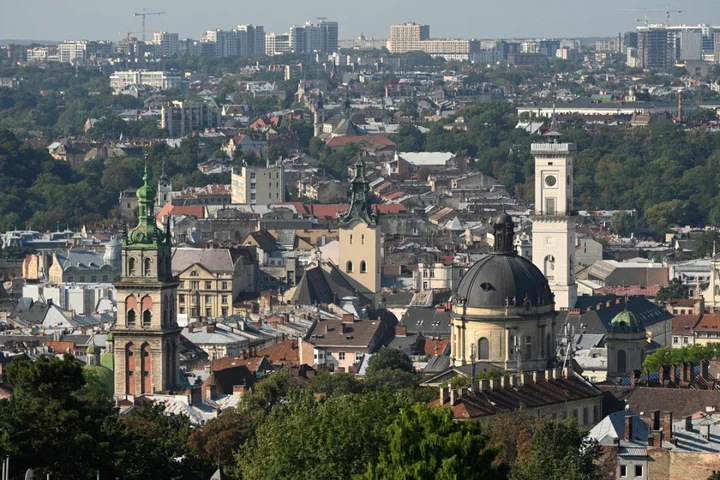
Explosions shake Lviv as western Ukraine under air raid alerts for Russian drone strikes
Blasts rocked Ukraine’s western city of Lviv in the early hours of Tuesday as Russia launched large-scale air attacks that struck an industrial warehouse, officials said. Local officials said air defence systems were engaged in repelling a Russian air attack that started in the early hours. From around 1am BST the entire western half of Ukraine was covered by air raid alerts. The mayor of Lviv, Andriy Sadovyi, and regional governor Maxim Kozitsky asked people to stay indoors due to the threat of continuing attacks in the region. “As a result of the strike on the territory of Lviv, we recorded a fire at an industrial warehouse,” he said. Follow latest live updates on coverage of Ukraine war here One injured person in the air attack was found under the wreckage, the mayor said. “There is a threat of a second attack. Air defence works in our region. Do not leave shelters, please!” the mayor said on his Telegram channel, starting the alert messages around 7am local time. “These are the sounds of air defence!!” he said. It is not immediately known if the attacks were caused using missiles and drones. The heavy aerial attacks from Russia on Ukraine commenced as the war neared 600 days of conflict and coincided with the start of president Volodymyr Zelensky’s visit to the US on Monday. The war-time president is making his second visit to the country after his last trip in December. He is likely to deliver a powerful address at the United Nations Security Council meeting on Ukraine on Wednesday. He will also address world leaders at the UN General Assembly on Tuesday. Mr Zelensky will come face-to-face with Russian foreign minister Sergei Lavrov in a first since Russia’s full-scale invasion in February last year. The Russian leader is also expected to make remarks at the meeting. Moscow is a veto-wielding member of the security council. Mr Zelensky is scheduled to spend some time Thursday on Capitol Hill and meet with president Joe Biden at the White House. Read More Heading for UN, Ukraine's president questions why Russia still has a place there 'Stop it!' UN's nuclear chief pushes Iran to end block on international inspectors Ukraine-Russia war – live: Kyiv commander says Russian defensive line breached near villages of Bakhmut How Ukraine’s battle for the Black Sea is inflicting serious pain on Putin’s forces Russian defensive lines breached in capture of villages near Bakhmut, Ukraine commander says
2023-09-19 13:18
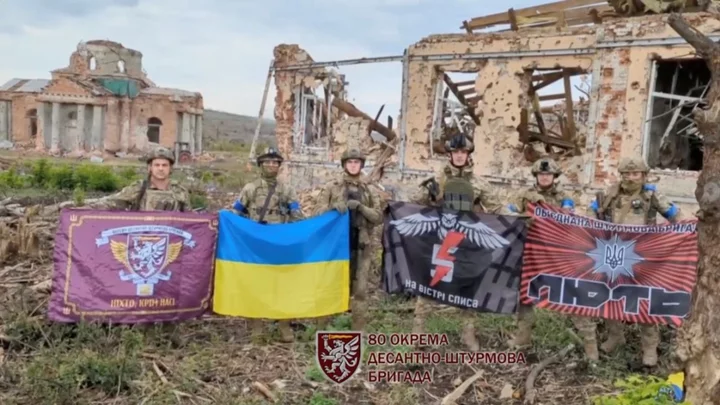
Ukraine-Russia war – live: Kyiv commander says Russian defensive line breached near villages of Bakhmut
New explosions struck Sevastopol and smoke was seen rising from a prominent landmark just kilometres away from the Crimean city as Ukrainian forces announced they were carrying out a joint intelligence operation in the region illegally annexed by Russia in 2014. Ukraine has recaptured the eastern village of Klishchiivka on the southern flank of Bakhmut after heavy fighting. It follows the recapture of Andriivka, another village in the region, Kyiv forces are said to be gaining ground. On Sunday they sent drones to disrupt air traffic in Moscow and caused a fire at an oil depot, according to Russian reports. "Klishchiivka was cleared of the Russians and liberated," Alexander Syrskyi, commander of Ukraine's ground forces, said in a post on the Telegram messaging app. It comes as Volodymyr Zelensky spoke out in an interview with CBS saying the conflict is ‘World War I with drones’. He explained the war is fought on a 700-mile front and the red area is the 20% of Ukraine still occupied by Russia where donated tanks should have advanced but they were stopped by Russian trenches, minefields and artillery. Read More Nato chief warns Putin eyes ‘long war’ as Ukraine claims eastern village Ukraine is the spotlight at UN leaders' gathering, but is there room for other global priorities? First cargo grain ships arrive in Ukraine through Black Sea using new route North Korea’s Kim Jong-un heads home after six-day Russian state visit
2023-09-19 12:20
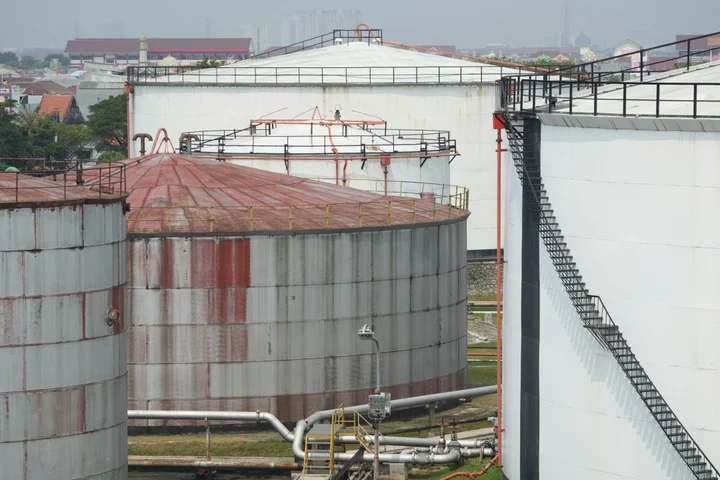
Oil Rally Gathers Pace as Brent Sets Up Test of $95 a Barrel
Oil traded near a 10-month high as the physical market showed fresh signs of tightness driven by supply
2023-09-19 10:16
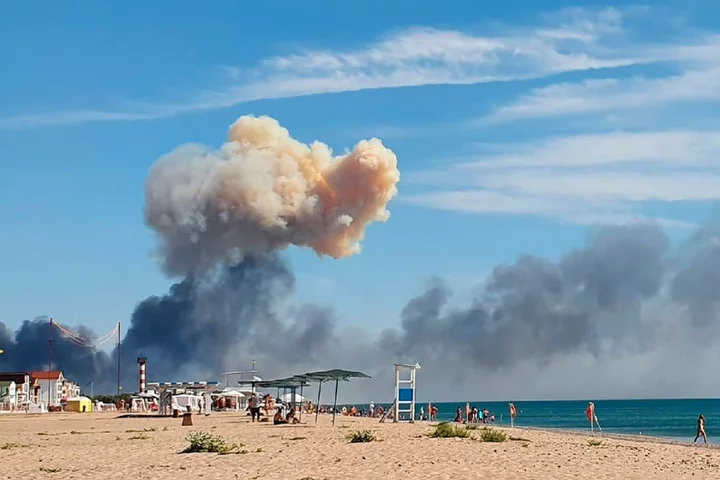
How Ukraine’s battle for the Black Sea is inflicting serious pain on Putin’s forces
Russian warships patrol the surface of the Black Sea, launvhing missiles at Ukrainian cities and towns as part of a near-daily assault. While also enforcing a de-facto blockade, leaving ships in little doubt of he consequences if they try to break it. Such is the importance of this shipping route for both sides. For along time Russian ships moved with relative impunity. And a grain deal that alllowed Ukraine to export from its ports on the Black Sea allowed for an uneasy status quo to hold. But after Moscow withdrew from that deal in the summer and stepped up attacks on Ukraine’s ports, and Kyiv began a counteroffensive to retake land occupied by Russia in sourthern and eastern Ukraine – the Black Sea has become one of the most active fronts in the war. For weeks, Kyiv has been sending a new class of sea drone – essentially unmanned speed boats packed with explosives that can travel many miles – seeking to create havoc and disrupt as much of Moscow’s war machine as it can to help the forces on land. The boats can reach speeds of up to 50mph and can carry a payload of explosives of up to 300 kilograms, according to reports. It is the type of innovative warfare that Kyiv has repeatedly used to push back against a far larger military force. These sea drones have been backed up by missile strikes, including using long-range Storm Shadow missiles from the UK. The most recent scalp? What is believed to be the largest Ukrainian attack on the headquarters of Russia’s Black Sea fleet since the start of Vladimir Putin’s invasion. Kyiv said that the attack on the base in the city of Sevastopol in Russian-occupied Crimea struck a submarine – which analysts suggested was likely a Kilo-class attack submarine that can launch cruise missiles of its own – and a landing vessel. It is thought that this is the first documented successful attack against a Russian submarine during Moscow’s 18-month war. Before that, Ukrainian special forces regained control of a number of oil and gas drilling platforms that Russia has used to help control the Black Sea in a “unique operation”, the country’s military intelligence (GUR) said. The UK’s Ministry of Defence has previously said the platforms could be used to launch helicopters, position long-range missile systems and as a base for forward deployment. ”Russia has been deprived of the ability to fully control the waters of the Black Sea, and this makes Ukraine many steps closer to regaining Crimea,” the GUR said. Meanwhile, two commercial ships have docked at a Ukrainian port in recent days as Kyiv steps up efforts to unilaterally break Russia’s blockade, using a corridor hugging the Black Sea coast of its southern neighbours and Nato members Romania and Bulgaria. Keir Giles, a senior consulting fellow of the Russia and Eurasia Programme at the Chatham House think tank, said the focus on the Black Sea by Ukrainian forces was a “relative change” and they aren’t “abandoning things they are doing on the front line in the east.” He said: “There are more noticeable things happening now that operations against Crimea are picking up pace. But that’s after a long period of preparation. “We saw earlier the attacks by missiles and special forces landing to reduce Russia’s air defence capability in Crimea and now as a result of that they [Ukrainian forces] can carry out those other operations that rely on those air defences being ineffective. “And that’s why we’re seeing this uptick in the pace... It’s also part of the process of eroding Russia’s sustainability of its hold on Crimea... making it so it will eventually be untenable.” As well as the strategic importance of the Black Sea, there is a symbolic element that can prove a powerful tool. Russia’s annexation of Crimea in 2014 is soemthign that Kyiv has been seeking to avenge for a long time. Hence the talk from Ukrainian officials about the retaking of Crimea being a long term goal (as well as the rest of the territory Russia has occupied during its current invasion). For Russia – and Putin in particular – there is also deep sumbolism in Crimea and the Black Sea. “It is a means by which they can throttle Ukraine, throttle its economy. As soon as they seized Crimea in 2014 it immediately compromised Ukraine’s ability to be able to trade and access the Black Sea from all of its eastern ports,” Giles says. “So from Crimea, Russia can project power over enormous distances, its a kind of outpost of Russian military power,” he added. Giles adds: “Ukraine doesn’t need control of the Black Sea to survive, it needs access to the Black Sea to survive. It’s needs the resumption of peaceful shipping without constantly being under threat from Russia. “That unfortunately is not a problem that will go away with the active phase of fighting in Ukraine. That’s one of the reasons why the idea of bringing the actual fighting to an end in a negogiated settlement with Russia is so fraught, because it means Russia can hold the Ukrainian economy hostage, by keeping that strangehold on its ports, particularly if it remains in control of Crimea.” Kyiv has repeatedly said that any peace settlement would need to include the return of all Ukrainian territory. We can expect Ukrainian attacks on the Black Sea and the Russian fleet in the area to continue. It is a way of keeping the pressure on Moscow while ground troops battle for every bloody inch on the fronlines in southern and eastern Ukraine. Any big hits, such as the recent one on the kilo-class submarine provide a propaganda boost as well as harming Russian capacity. Neither Kyiv or Moscow will want to cede anything in the Black Sea, so this will become an increasingly important part of the war. Read More Ukraine-Russia war – live: ‘Significant losses’ for Putin’s troops as Kyiv’s offensive retakes another village Putin meets the leader of Belarus, who suggests joining Russia's move to boost ties with North Korea Kim Jong-un unexpectedly extends visit to Russia as he gleefully tours more weapons facilities The Body in the Woods | An Independent TV Original Documentary The harrowing discovery at centre of The Independent’s new documentary
2023-09-19 00:28
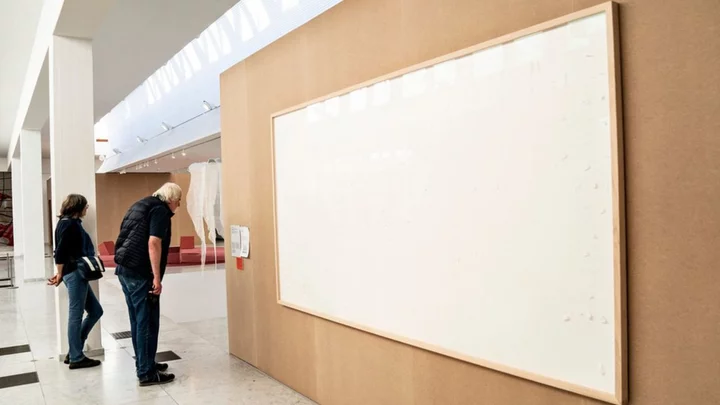
Danish artist told to repay museum €67,000 after turning in two blank canvasses
Jens Haaning was given about €67,000 by a Danish museum to create art, but sent it blank canvasses.
2023-09-19 00:28
